| Listing 1 - 10 of 12 | << page >> |
Sort by
|
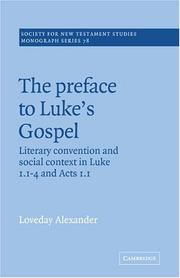
ISBN: 0521434440 0521018811 0511554826 9780521434447 9780511554827 9780521018814 Year: 1993 Volume: 78 Publisher: Cambridge Cambridge University Press
Abstract | Keywords | Export | Availability | Bookmark
 Loading...
Loading...Choose an application
- Reference Manager
- EndNote
- RefWorks (Direct export to RefWorks)
Luke's two-volume work begins with a formal preface unlike anything else in the New Testament, and it has long been academic orthodoxy that Luke's choice of style, vocabulary, and content in this short passage reveal a desire to present his work to contemporary readers as 'History' in the great tradition of Thucydides and Polybius. This study challenges that assumption: far from aping the classical historians, Dr Alexander argues, Luke was simply introducing his book in a style that would have been familiar to readers of the scientific and technical manuals which proliferated in the hellenistic world. The book contains a detailed study of these Greek 'scientific' prefaces as well as a word-by-word commentary on the Lucan texts. In her concluding chapters, Alexander seeks to explore the consequences of this alignment both for the literary genre of Luke-Acts (is it meant to be read as 'history'?) and for the social background of the author and the book's first readers.
226.4 --- Evangelie volgens Lucas --- Bible. N.T. Luke I, 1-4 --- Criticism, interpretation, etc --- Bible. N.T. Acts I, 1 --- Bible. - N.T. - Luke I, 1-4 - Criticism, interpretation, etc. --- Bible. - N.T. - Acts I, 1 - Criticism, interpretation, etc. --- Arts and Humanities --- Religion --- Bible. --- Criticism, interpretation, etc.
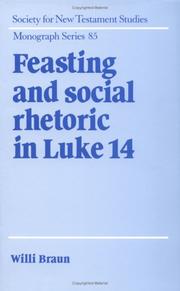
ISBN: 0521495539 0521018854 0511520301 9780521495530 9780511520303 9780521018852 Year: 1995 Volume: 85 Publisher: Cambridge Cambridge University Press
Abstract | Keywords | Export | Availability | Bookmark
 Loading...
Loading...Choose an application
- Reference Manager
- EndNote
- RefWorks (Direct export to RefWorks)
The writer of the Gospel of Luke is a Hellenistic writer who uses conventional modes of narration, characterisation and argumentation to present Jesus in the manner of the familiar figure of the dinner sage. In this original and thought-provoking 1995 study, Willi Braun draws both on social and literary evidence regarding the Greco-Roman élite banquet scene and on ancient prescribed methods of rhetorical composition. He argues that the Pharisaic dinner episode in Luke 14 is a skilfully crafted rhetorical unit in which Jesus presents an argument for Luke's vision of a Christian society. His contention that the point of the episode is directed primarily at the wealthy urban élite, who stand in most need of a transformation of character and values to fit them for membership of this society, points up the way in which gospel writers manipulated the inherited Jesus traditions for the purposes of ideological and social formation of Christian communities.
Dinners and dining in the Bible --- Bible. --- Criticism, interpretation, etc. --- 226.4 --- Evangelie volgens Lucas --- Bible. N.T. Luke XIV, 1-24 --- Criticism, interpretation, etc --- Bible. - N.T. - Luke XIV, 1-24 - Criticism, interpretation, etc. --- Arts and Humanities --- Religion --- Dinners and dining in the Bible.
Book
ISBN: 9065694099 Year: 1989 Volume: vol 2 Publisher: Brussel Koninklijke akademie voor wetenschappen, letteren en schone kunsten van Belgie
Abstract | Keywords | Export | Availability | Bookmark
 Loading...
Loading...Choose an application
- Reference Manager
- EndNote
- RefWorks (Direct export to RefWorks)
Bibliografieën --- Bibliographies --- Nieuwe Testament --- Nouveau Testament --- 226.4 --- 225 <01> --- Academic collection --- Evangelie volgens Lucas --- Bijbel: Nieuw Testament--Bibliografieën. Catalogi --- Bible. N.T. Luke --- Bibliography --- Bible. n.t. luc --- Bibliographie
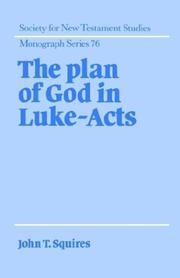
ISBN: 0521431751 0521616123 0511470487 9780521431750 9780511470486 9780521616126 Year: 1993 Volume: 76 Publisher: Cambridge Cambridge University Press
Abstract | Keywords | Export | Availability | Bookmark
 Loading...
Loading...Choose an application
- Reference Manager
- EndNote
- RefWorks (Direct export to RefWorks)
This study examines one significant theological theme in Luke-Acts, that of 'The plan of God'. It traces the way this theme is developed throughout Luke-Acts, both through direct statements by the writer and through various associated means such as divine appearances, signs and wonders, the fulfilment of prophecy, and indications of fate as of necessity. Dr Squires locates Luke's use of this theme in the context of the history-writing of the Hellenistic period, noting numerous passages in those works which illumine Luke's theological purposes. His book shows how the notion of the plan of God is used by Luke as he writes to confirm his readers' faith, encouraging them to bear witness to this faith, and equipping them for the task of defending it.
Providence and government of God --- Biblical teaching. --- -#GROL:SEMI-225<08> Soci 76 --- #GROL:SEMI-226.4 --- God --- Biblical teaching --- Providence and government --- Sovereignty --- Bible. N.T. Luke --- Theology --- Bible. N.T. Acts --- Providence and government of God - Biblical teaching. --- Bible. N.T. Luke - Theology. --- Bible. N.T. Acts - Theology. --- #GROL:SEMI-225<08> Soci 76 --- Bible. --- Luc (Book of the New Testament) --- Lucas (Book of the New Testament) --- Luka (Book of the New Testament) --- Lukan săn zăn︠g︡g (Book of the New Testament) --- Lukas (Book of the New Testament) --- Luke (Book of the New Testament) --- Lūqā (Book of the New Testament) --- Nuga pogŭm (Book of the New Testament) --- Ruka den --- Ruka ni yoru fukuinsho --- Acts (Book of the New Testament) --- Acts of the Apostles --- Chongdo haengjŏn --- Sado haengjŏn --- Theology. --- Arts and Humanities --- Religion
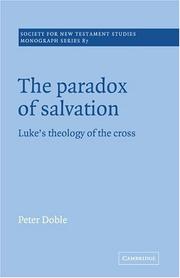
ISBN: 0521552125 0521018862 0511470436 9780521552127 9780511470431 9780521018869 Year: 1996 Volume: 87 Publisher: Cambridge Cambridge University Press
Abstract | Keywords | Export | Availability | Bookmark
 Loading...
Loading...Choose an application
- Reference Manager
- EndNote
- RefWorks (Direct export to RefWorks)
This study refutes the allegation that the author of Luke-Acts showed no systematic thought about the significance of Jesus's death, that is, he has no theologia crucis. Peter Doble focuses sharply on the Gospel's death scene and explores those features which appear in Luke alone, then extends the results into the longer account of Jesus's final days in Jerusalem. In the final section Doble demonstrates how specific words and patterns from Wisdom shape and fill Luke's retelling of the story of Jesus's entrapment, trials and death. Luke wanted his readers to understand that what had happened to Jesus was not a humiliating rejection but in accord with scripture's presentation of God's plan for salvation, and he modelled traditional material about Jesus's road to the crucifixion around an explanatory model which he drew from Wisdom.
Salvation --- Biblical teaching. --- 226.4 --- -Salvation --- Religion --- Evangelie volgens Lucas --- Biblical teaching --- Jesus Christ --- -Christ --- Cristo --- Jezus Chrystus --- Jesus Cristo --- Jesus, --- Jezus --- Christ, Jesus --- Yeh-su --- Masīḥ --- Khristos --- Gesù --- Christo --- Yeshua --- Chrystus --- Gesú Cristo --- Ježíš --- Isa, --- Nabi Isa --- Isa Al-Masih --- Al-Masih, Isa --- Masih, Isa Al --- -Jesus, --- Jesucristo --- Yesu --- Yeh-su Chi-tu --- Iēsous --- Iēsous Christos --- Iēsous, --- Kʻristos --- Hisus Kʻristos --- Christos --- Jesuo --- Yeshuʻa ben Yosef --- Yeshua ben Yoseph --- Iisus --- Iisus Khristos --- Jeschua ben Joseph --- Ieso Kriʻste --- Yesus --- Kristus --- ישו --- ישו הנוצרי --- ישו הנצרי --- ישוע --- ישוע בן יוסף --- المسيح --- مسيح --- يسوع المسيح --- 耶稣 --- 耶稣基督 --- 예수그리스도 --- Jíizis --- Yéshoua --- Iėsu̇s --- Khrist Iėsu̇s --- عيسىٰ --- Crucifixion --- -Biblical teaching --- -Evangelie volgens Lucas --- -Crucifixion --- Bible. N.T. Luke XXIII, 13-49 --- Criticism, interpretation, etc --- Bible. - N.T. - Luke XXIII, 13-49 - Criticism, interpretation, etc. --- Christ --- عيسىٰ --- Bible. --- Theology. --- Arts and Humanities --- Salvation - Biblical teaching.
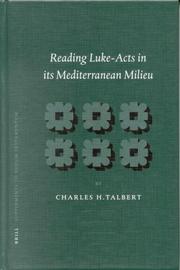
ISBN: 1280467231 9786610467235 1423711912 9047401980 9789047401988 9004129642 9781423711919 9789004129641 Year: 2003 Volume: 107 Publisher: Leiden Boston Brill
Abstract | Keywords | Export | Availability | Bookmark
 Loading...
Loading...Choose an application
- Reference Manager
- EndNote
- RefWorks (Direct export to RefWorks)
This volume pulls together thirteen essays written by the author since the late 1970's which give a distinctive, coherent reading of Luke-Acts. Twelve of the essays focus on the theological perspectives of Luke and Acts as they can be discerned from the angle of vision of the 'authorial audience' as delineated by the non-biblical literary critic, Peter J. Rabinowitz. The final essay focuses on the possible historical value of Acts and the methodology involved in judging that possibility.
Bible.-- N.T.-- Luke-- Criticism, interpretation, etc. --- Christianity --- Religion --- Philosophy & Religion --- Bible. --- Criticism, interpretation, etc. --- Acts (Book of the New Testament) --- Acts of the Apostles --- Chongdo haengjŏn --- Sado haengjŏn --- Luc (Book of the New Testament) --- Lucas (Book of the New Testament) --- Luka (Book of the New Testament) --- Lukan săn zăn︠g︡g (Book of the New Testament) --- Lukas (Book of the New Testament) --- Luke (Book of the New Testament) --- Lūqā (Book of the New Testament) --- Nuga pogŭm (Book of the New Testament) --- Ruka den --- Ruka ni yoru fukuinsho --- Criticism, interpretation, etc --- Bible. N.T. Acts --- Bible. N.T. Luke --- 226.4 --- 226.6 --- Evangelie volgens Lucas --- Handelingen der apostelen. Akten van de apostelen
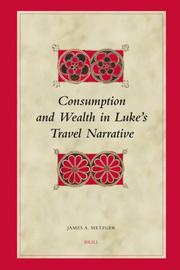
ISBN: 9004162615 9786612397714 1282397710 9047421744 9789047421740 9789004162617 Year: 2007 Publisher: Leiden Boston Brill
Abstract | Keywords | Export | Availability | Bookmark
 Loading...
Loading...Choose an application
- Reference Manager
- EndNote
- RefWorks (Direct export to RefWorks)
It is suggested that because persons with access to a large surplus too often elect to spend extravagantly on their own desires and existing means of redistribution such as almsgiving and beneficence were failing to offer any lasting changes that might truly be received as 'good news' by the poor, Jesus advocates eliminating personal wealth.
Bible. N.T. Luke -- Criticism, interpretation, etc. --- Christian stewardship -- Biblical teaching. --- Wealth -- Biblical teaching. --- Wealth --- Consumption (Economics) --- Christian stewardship --- Christianity --- Religion --- Philosophy & Religion --- Biblical teaching --- Biblical teaching. --- Bible. --- Criticism, interpretation, etc. --- Stewardship, Christian --- Consumer demand --- Consumer spending --- Consumerism --- Spending, Consumer --- Luc (Book of the New Testament) --- Lucas (Book of the New Testament) --- Luka (Book of the New Testament) --- Lukan săn zăn︠g︡g (Book of the New Testament) --- Lukas (Book of the New Testament) --- Luke (Book of the New Testament) --- Lūqā (Book of the New Testament) --- Nuga pogŭm (Book of the New Testament) --- Ruka den --- Ruka ni yoru fukuinsho --- Christian life --- Demand (Economic theory) --- Consumptie. --- Lucas (bijbelboek) --- Rijkdom.
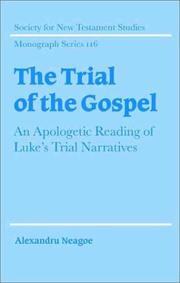
ISBN: 0521809487 0521020697 1107124964 0511176538 051115741X 0511329644 0511488092 1280419415 0511044860 9780521809481 0511016581 9780511016585 9780511488092 9780511044861 9780511157417 9781280419416 9781107124967 9780511176531 9780511329647 Year: 2002 Volume: 116 Publisher: Cambridge, U.K. New York Cambridge University Press
Abstract | Keywords | Export | Availability | Bookmark
 Loading...
Loading...Choose an application
- Reference Manager
- EndNote
- RefWorks (Direct export to RefWorks)
For many years Luke-Acts has been studied as a work of history and theology. The Trial of the Gospel sets out to examine Luke's writings as an apologetic work, by focusing on those parts of Luke's story where the apologetic overtones seem most prominent - the trial narratives. By analysing the trials of all major Lukan characters - Jesus, Peter, Stephen, and Paul - Alexandru Neagoe argues that the narratives are best understood when viewed as part of Luke's apologia pro evangelio, a purpose which is in keeping with the author's declared aim to give his readers 'assurance' about the 'matters' in which they had been instructed (Luke 1:4). Neagoe concludes that the specific role of the trial narratives is to provide the framework within which important tenets of the Christian faith are themselves put 'on trial' before the reader, with the intended result of the gospel's confirmation.
Trials in the Bible. --- Apologetics --- History --- Processen (Recht) in de Bijbel --- Procès (Droit) dans la Bible --- Trials in the Bible --- Bible. N.T. Luke --- Criticism, interpretation, etc --- Bible. N.T. Acts --- Primitive and early church, ca. 30-600 A.D. --- 226.4 --- Evangelie volgens Lucas --- Bible. --- Luc (Book of the New Testament) --- Lucas (Book of the New Testament) --- Luka (Book of the New Testament) --- Lukan săn zăn︠g︡g (Book of the New Testament) --- Lukas (Book of the New Testament) --- Luke (Book of the New Testament) --- Lūqā (Book of the New Testament) --- Nuga pogŭm (Book of the New Testament) --- Ruka den --- Ruka ni yoru fukuinsho --- Acts (Book of the New Testament) --- Acts of the Apostles --- Chongdo haengjŏn --- Sado haengjŏn --- Criticism, interpretation, etc. --- Arts and Humanities --- Religion
Book
ISBN: 128312002X 9786613120021 9004201599 9789004201590 9789004189201 9004189203 9781283120029 6613120022 Year: 2011 Volume: 139 Publisher: Leiden Boston Brill
Abstract | Keywords | Export | Availability | Bookmark
 Loading...
Loading...Choose an application
- Reference Manager
- EndNote
- RefWorks (Direct export to RefWorks)
Scholars of Christian origins often regard Luke-Acts and the writings of Justin Martyr as similar accounts of the replacement of Israel by the non-Jewish church. According to this view, both authors commandeer the Jewish scriptures as the sole possession of non-Jewish Christ-believers, rather than of Jews. Offering a fresh analysis of the exegesis of Luke and Justin, this book uncovers significant differences between their respective depictions of the privileged status that Christ-believers hold in relation to the Jewish scriptures. Although both authors argue that Christ-believers alone possess an inspired capacity to interpret the Jewish scriptures, unlike Justin, Luke envisages an ongoing role for the Jewish people as recipients of the promises that God pledged to Israel.
Bible. N.T. Acts -- Relation to the Old Testament. --- Bible. N.T. Acts -- Theology. --- Bible. N.T. Luke -- Relation to the Old Testament. --- Bible. N.T. Luke -- Theology. --- Bible. O.T. -- Criticism, interpretation, etc. -- History -- Early church, ca. 30-600. --- Bible. O.T. -- Relation to Acts. --- Bible. O.T. -- Relation to Luke. --- Judaism (Christian theology) - Biblical teaching. --- Judaism (Christian theology) -- Biblical teaching. --- Judaism (Christian theology) - History of doctrines - Early church, ca. 30-600. --- Judaism (Christian theology) -- History of doctrines -- Early church, ca. 30-600. --- Justin - Views on Judaism. --- Justin - Views on the Old Testament. --- Justin, Martyr, Saint -- Views on Judaism. --- Justin, Martyr, Saint -- Views on the Old Testament. --- Judaism (Christian theology) --- Religion --- Philosophy & Religion --- Christianity --- Biblical teaching --- History of doctrines --- Biblical teaching. --- Justin, --- Views on Judaism. --- Views on the Old Testament. --- Bible. --- Theology. --- Relation to the Old Testament. --- Relation to Luke. --- Relation to Acts. --- Criticism, interpretation, etc. --- History --- Giustino, --- Iustin, --- Iustin Samaritanin --- Iustinus, --- Justino, --- Justinus, --- Yusṭinus, --- יוסטינוס, --- Antico Testamento --- Hebrew Bible --- Hebrew Scriptures --- Kitve-ḳodesh --- Miḳra --- Old Testament --- Palaia Diathēkē --- Pentateuch, Prophets, and Hagiographa --- Sean-Tiomna --- Stary Testament --- Tanakh --- Tawrāt --- Torah, Neviʼim, Ketuvim --- Torah, Neviʼim u-Khetuvim --- Velho Testamento --- Acts (Book of the New Testament) --- Acts of the Apostles --- Chongdo haengjŏn --- Sado haengjŏn --- Luc (Book of the New Testament) --- Lucas (Book of the New Testament) --- Luka (Book of the New Testament) --- Lukan săn zăn︠g︡g (Book of the New Testament) --- Lukas (Book of the New Testament) --- Luke (Book of the New Testament) --- Lūqā (Book of the New Testament) --- Nuga pogŭm (Book of the New Testament) --- Ruka den --- Ruka ni yoru fukuinsho --- Christianity and other religions --- Judaism --- Pseudo-Justinus --- Views on Judaism --- Views on the Old Testament --- Theology --- Relation to the Old Testament --- Relation to Luke --- Relation to Acts --- Communities --- Judaïsme (Théologie chrétienne) --- Communauté --- Religious aspects --- Enseignement biblique --- Histoire des doctrines --- Aspect religieux --- Christianisme --- 226.6 --- 276 =75 JUSTINUS MARTYR, Philosophus --- Handelingen der apostelen. Akten van de apostelen --- Griekse patrologie--JUSTINUS MARTYR, Philosophus --- Judaism (Christian theology) - Biblical teaching --- Judaism (Christian theology) - History of doctrines - Early church, ca. 30-600 --- Justin, - Martyr, Saint - Views on Judaism --- Justin, - Martyr, Saint - Views on the Old Testament --- Giustino --- Iustin --- Iustinus --- Justin --- Justino --- Justinus --- Yusṭinus --- Justin, - Martyr, Saint
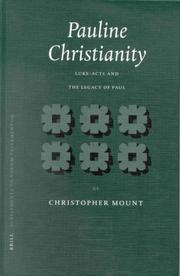
ISBN: 1280466618 9786610466610 1417510501 9047401379 9004124721 9789047401377 9781417510504 9789004124721 9781280466618 6610466610 Year: 2002 Volume: 104 Publisher: Leiden Boston Brill
Abstract | Keywords | Export | Availability | Bookmark
 Loading...
Loading...Choose an application
- Reference Manager
- EndNote
- RefWorks (Direct export to RefWorks)
Pauline Christianity takes a fresh perspective on the composition and reception of Luke-Acts in relation to the category ‘Pauline Christianity’ as it has been used to describe traditions, communities, and persons connected to Paul. This inquiry is pursued along three lines. (1) The reception of the Acts of the Apostles and the ‘Pauline’ Luke by Irenaeus is addressed. (2) The compositional intentions of the author of Luke-Acts in constructing ‘Pauline’ Christianity are analyzed. (3) The literary Paulinism of the author is separated from the Paulinism of his sources. This study contributes to the ongoing discussion of Paul’s role in the history of early Christianity by making clear the extent to which the ‘Pauline Christianity’ of Luke-Acts has its origins in various second-century attempts to reconstruct the Christian origins.
Bible.-- N.T.-- Acts-- Criticism, interpretation, etc. --- Christianity --- Religion --- Philosophy & Religion --- Bible. --- Criticism, interpretation, etc. --- Theology. --- Acts (Book of the New Testament) --- Acts of the Apostles --- Chongdo haengjŏn --- Sado haengjŏn --- Epistles of Paul --- Paul, Epistles of --- Paul Sŏsin --- Pauline epistles --- Risālat al-Qiddīs Būlus al-rasūl al-thāniyah ilá Tīmūthīʼūs --- Luc (Book of the New Testament) --- Lucas (Book of the New Testament) --- Luka (Book of the New Testament) --- Lukan săn zăn︠g︡g (Book of the New Testament) --- Lukas (Book of the New Testament) --- Luke (Book of the New Testament) --- Lūqā (Book of the New Testament) --- Nuga pogŭm (Book of the New Testament) --- Ruka den --- Ruka ni yoru fukuinsho --- Criticism, interpretation, etc --- Theology --- Paul, --- Jesus Christ --- Contributions in Christology. --- Teachings. --- History of doctrines --- Paul --- Contributions in christology --- Bible. N.T. Epistles of Paul --- Bible. N.T. Luke --- Bible. N.T. Acts --- Teachings --- Primitive and early church, ca. 30-600 A.D. --- Christian theology --- Theology, Christian --- 226.6 --- Handelingen der apostelen. Akten van de apostelen --- New Testament. --- הברית החדשה. --- תיאולוגיה --- ביקורת, פרשנות וכד'
| Listing 1 - 10 of 12 | << page >> |
Sort by
|

 Search
Search Feedback
Feedback About UniCat
About UniCat  Help
Help News
News